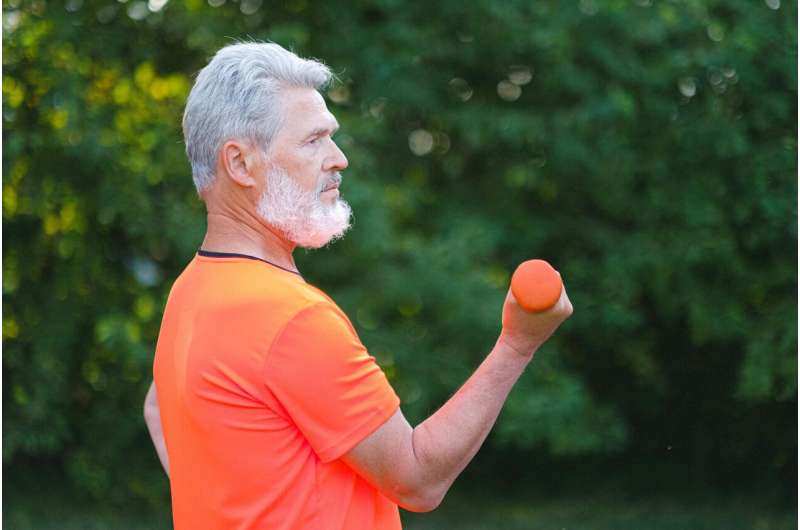This article has been reviewed according to Science X's editorial process and policies. Editors have highlighted the following attributes while ensuring the content's credibility:
fact-checked
peer-reviewed publication
trusted source
proofread
Weight training improves symptoms of anxiety and depression in old people, study confirms

Weight training can help reduce body fat and increase muscle strength and mass in older people, contributing to functional autonomy and avoidance of falls and injury. Furthermore, recent studies have shown that it can also benefit the mental health of older people, especially those who suffer from anxiety and depression.
These benefits were confirmed by a study reported in the journal Psychiatry Research. The study involved a systematic review and meta-analysis of more than 200 articles on the subject. The analysis was conducted by Paolo Cunha, a postdoctoral fellow at the Albert Einstein Jewish-Brazilian Institute of Education and Research (IIEPAE) in São Paulo, Brazil.
"Resistance training has been shown to be one of the most effective non-pharmacological strategies for healthy aging. It promotes countless health benefits, including improvements to mental health," Cunha said.
The findings of the study are highly promising, he continued. Besides improvements to symptoms of anxiety and depression in the general population, weight training appears to have a more significant effect on people with a confirmed diagnosis of anxiety or depression disorder.
"Epidemiological studies have shown that the decrease in muscle strength and mass that occurs naturally as we age may be associated with an increase in mental health problems, given the existence of various physiological mechanisms that bring about functional and structural changes and that are controlled by the brain," Cunha said.
Another important mental health benefit, he added, is that when weight training is done in a group, it contributes to more social interaction among those involved.
Recommended exercises
The investigation also pointed to the best ways of structuring one's training to improve mental health. "How the training is done appears to influence the results achieved. The information obtained so far suggests that older people should ideally do weight training exercises three times a week, with three sets of each exercise and sessions that are not too long—six exercises would seem to be sufficient.
"Do less, but do it well: a short set produces better results. This is meaningful information, as we lack guidelines with specific recommendations for resistance training that focuses on mental health parameters," Cunha said.
While there are many possible ways to prescribe resistance training programs designed to improve the health, autonomy and quality of life for older people, most result directly or indirectly in improvements to symptoms of anxiety and depression, regardless of the intensity and volume of the exercises involved, according to Edilson Cyrino, last author of the article and principal investigator for the study. He is a professor at the State University of Londrina (UEL) and coordinates the Active Aging Longitudinal Study, a project begun in 2012 to analyze the impact of resistance training on parameters relating to the health of older women.
Another point observed by the researchers was that the use of training machines and free weights appears to be more beneficial for mental health than exercises that involve elastic bands or calisthenics (using the weight of the person's body), for example.
"We don't have statistics comparing the two kinds of training, but the analysis showed that resistance training with weights and other gear is more effective in terms of improving the mental health of older people, largely because the intensity and volume of the exercises can be more precisely controlled," Cunha explained.
In the article, the researchers note that despite the incontestable mental health benefits of weight training, important gaps remain and should be filled by further studies.
"Generally speaking, most studies have involved a small number of volunteers, which hinders an understanding of how the phenomenon occurs and the main mechanisms that explain it. This research field has expanded in recent years and has ample room for more advances," Cunha said.
Cunha is currently conducting a project in partnership with the Research Group on Clinical Intervention and Cardiovascular Disease (GEPICARDIO) at the Albert Einstein Jewish Brazilian Hospital (HIAE) to analyze the impact of long periods of sedentarism on vascular and cognitive functions in older people.
More information: Paolo M. Cunha et al, Can resistance training improve mental health outcomes in older adults? A systematic review and meta-analysis of randomized controlled trials, Psychiatry Research (2024). DOI: 10.1016/j.psychres.2024.115746





















